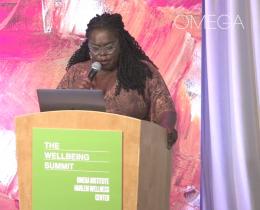It's good to march. It's good to picket. It's good to write stinging blog posts, and it's good to use the power of our voices to raise these issues. But, again, it's a momentary feel good. It's something that we need to do because it lets us know we're in solidarity with others. We have to take that solidarity moment and turn it into real action, and that's the slogging hard work of real movement building. That's what we have the opportunity to do right now.
This is hard work but it's also joyous work. It's energizing work. Often people don't know where to begin, so they default to doing one small thing. It certainly does take an accumulation of small things to make big systemic change—there's no doubt of that. But it needs to be strategic.
Omega: What is the first action that women can strategically take to contribute to that deeper societal change?
Gloria: The first thing people need to do is to spend some time working on themselves and getting in touch with their internal locus of power. You have to start with a deep understanding of yourself: what your most deeply held values are and what you'll walk away from if you violate those values. Once you can get to that place, then you can stake out what piece of this work you want to do.
Not everybody has to start a new nonprofit organization. Not everybody has to be standing in the public square or run for office—but those are all options. Some people will want to do that. If you're not somebody who wants to do that, then you can support someone else who does. You can proactively support someone who is running for office and shares your values. You can proactively support an organization that is working to accomplish the change you think needs to happen in the world.
Omega: How does your work help women identify how they can contribute to this moment?
Gloria: I like to start by deconstructing power and looking at how it's been defined over the ages. It’s mostly been through a male lens, which has been largely defined through conflict and war and power over people, things, and resources. Then we peel it back and see that power actually has no inherent characteristics.
Power is like a hammer. You can build something with it or you can break something apart. That gives us the freedom to define power in a positive way.
I hear women say, "Oh yes, I want that type of power. I didn't like the idea of power before but now I love it because with ‘power to’ I know there's no finite pie."
When I act from “power to,” I can operate from knowing that there are plenty of pies, or I can bake more pies. There's no limit to resources like innovation, creativity, intelligence, and love. I can always make things happen because I have access to unlimited supplies of that kind of power. Power enables me to do good things for my family, myself, my community, the world. We shift how we're thinking about it.
Once we've done that, we look at a definition of leadership that is really very simple. For me, a leader is somebody who gets stuff done. And that frees people. You don't have to have that Ivy League degree. You don't necessarily have to come from wealth. From wherever you are in your life or your organization, you can be a leader because you have the capability to get stuff done.
Omega: What is something that people can do right now to deepen their own leadership and “get stuff done?”
Gloria: I believe in making an intention journal. This is kind of amusing: my intention is to do my intention journal every day. I don't always hit that mark. But the idea is before I get out of bed in the morning I go to the notes function in my phone and I keep a running list of my daily intentions. I look to see what I did on previous days and I focus on what's the most important thing I can do today that will further that big intention that I have.
When I look at it cumulatively, I begin to see the pattern of what impact I can have just by having those daily intentions. It doesn't require you to leave your day job. It may be as simple as writing a letter to the editor once a month. There are many different things you can do. But for women who work in organizations, there are so many things you can do internally. You can go into a meeting prepared in advance to support your female colleagues in whatever proposal they're intending to make. Or you can ask them to support you.
The cumulative effect ultimately changes the power balance in the room. And we know this is about power.
Omega: What is in your own intention journal?
Gloria: I'll tell you, this is my ugly secret. The thing I hate the most to do is make those really important phone calls. I hate the telephone. I hate to call someone for work and ask, "Can you give me a million dollars?" I procrastinate those calls. But if I put it in my intention journal, I get sick and tired of seeing it popping up every day until I do it and so I finally do it.
The intention journal helps you do the thing you hate to do. And usually the thing you hate to do is most important for you to do.



